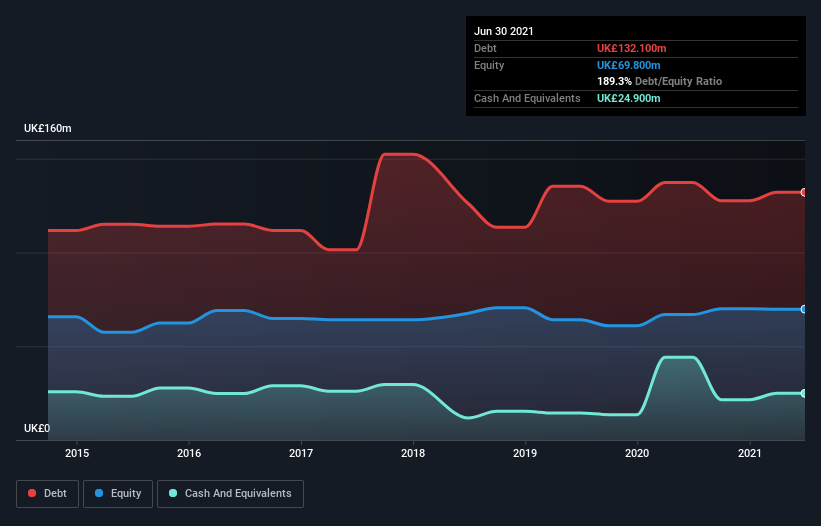Unfortunately for shareholders, when McBride plc (LON:MCB) reported results for the period to June 2021, its auditors, PricewaterhouseCoopers LLP, expressed uncertainty about whether it can continue as a going concern. Thus we can say that, based on the results to that date, the company should raise capital or otherwise raise cash, without much delay.
Given its situation, it may not be in a good position to raise capital on favorable terms. So current risks on the balance sheet could have a big impact on how shareholders fare from here. Debt is always a risk factor in these cases, as creditors could be in a position to wind up the company, in the worst case scenario.
Check out our latest analysis for McBride
What Is McBride's Net Debt?
As you can see below, McBride had UK£132.1m of debt, at June 2021, which is about the same as the year before. You can click the chart for greater detail. However, it also had UK£24.9m in cash, and so its net debt is UK£107.2m.

How Strong Is McBride's Balance Sheet?
According to the last reported balance sheet, McBride had liabilities of UK£233.5m due within 12 months, and liabilities of UK£128.5m due beyond 12 months. On the other hand, it had cash of UK£24.9m and UK£118.5m worth of receivables due within a year. So it has liabilities totalling UK£218.6m more than its cash and near-term receivables, combined.
This deficit casts a shadow over the UK£136.8m company, like a colossus towering over mere mortals. So we'd watch its balance sheet closely, without a doubt. After all, McBride would likely require a major re-capitalisation if it had to pay its creditors today.
We use two main ratios to inform us about debt levels relative to earnings. The first is net debt divided by earnings before interest, tax, depreciation, and amortization (EBITDA), while the second is how many times its earnings before interest and tax (EBIT) covers its interest expense (or its interest cover, for short). Thus we consider debt relative to earnings both with and without depreciation and amortization expenses.
McBride has a debt to EBITDA ratio of 2.7 and its EBIT covered its interest expense 6.3 times. Taken together this implies that, while we wouldn't want to see debt levels rise, we think it can handle its current leverage. Shareholders should be aware that McBride's EBIT was down 20% last year. If that decline continues then paying off debt will be harder than selling foie gras at a vegan convention. There's no doubt that we learn most about debt from the balance sheet. But ultimately the future profitability of the business will decide if McBride can strengthen its balance sheet over time. So if you're focused on the future you can check out this free report showing analyst profit forecasts.
Finally, a business needs free cash flow to pay off debt; accounting profits just don't cut it. So we always check how much of that EBIT is translated into free cash flow. Over the last three years, McBride reported free cash flow worth 16% of its EBIT, which is really quite low. That limp level of cash conversion undermines its ability to manage and pay down debt.
Our View
To be frank both McBride's level of total liabilities and its track record of (not) growing its EBIT make us rather uncomfortable with its debt levels. Having said that, its ability to cover its interest expense with its EBIT isn't such a worry. Taking into account all the aforementioned factors, it looks like McBride has too much debt. While some investors love that sort of risky play, it's certainly not our cup of tea. While some investors may specialize in these sort of situations, it's simply too risky and complicated for us to want to invest in a company after an auditor has expressed doubts about its ability to continue as a going concern. Our preference is to invest in companies that always make sure the auditor has confidence that the company will continue as a going concern. When analysing debt levels, the balance sheet is the obvious place to start. However, not all investment risk resides within the balance sheet - far from it. Be aware that McBride is showing 3 warning signs in our investment analysis , and 2 of those make us uncomfortable...
At the end of the day, it's often better to focus on companies that are free from net debt. You can access our special list of such companies (all with a track record of profit growth). It's free.
New: Manage All Your Stock Portfolios in One Place
We've created the ultimate portfolio companion for stock investors, and it's free.
• Connect an unlimited number of Portfolios and see your total in one currency
• Be alerted to new Warning Signs or Risks via email or mobile
• Track the Fair Value of your stocks
This article by Simply Wall St is general in nature. We provide commentary based on historical data and analyst forecasts only using an unbiased methodology and our articles are not intended to be financial advice. It does not constitute a recommendation to buy or sell any stock, and does not take account of your objectives, or your financial situation. We aim to bring you long-term focused analysis driven by fundamental data. Note that our analysis may not factor in the latest price-sensitive company announcements or qualitative material. Simply Wall St has no position in any stocks mentioned.
Have feedback on this article? Concerned about the content? Get in touch with us directly. Alternatively, email editorial-team (at) simplywallst.com.
About LSE:MCB
McBride
Manufactures and sells private label household and personal care products to retailers and brand owners in the United Kingdom, Germany, France, Italy, Spain, rest of Europe, the Asia-Pacific, and internationally.
Very undervalued with adequate balance sheet.
Market Insights
Community Narratives



